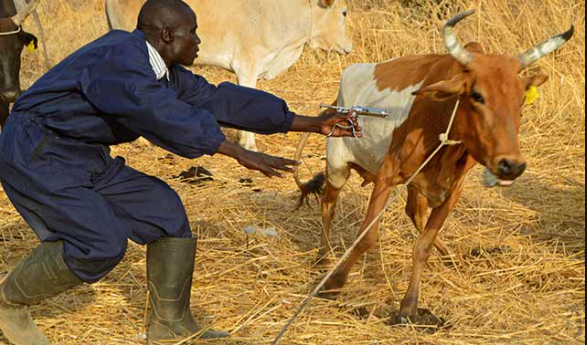The United Nations Food and Agriculture Organization (UNFAO), in collaboration with the state ministry of animal resources, over the weekend launched a vaccination campaign targeting 95,000 livestock in Lakes State.
The campaign was launched in Manyiel cattle camp in Rumbek Central County on Saturday.
The caretaker minister of the animal resources and fisheries ministry, who is the minister of cooperatives and rural development, Philip Taban Chir, appreciated FAO for supporting the state by donating drugs and vaccines for cattle. He urged livestock owners to take their animals for vaccination.
“I request cattle keepers to bring their animals closer to accessible cattle camps for vaccination early because the rainy season is now approaching and it comes with lots of livestock diseases,” Minister Chir advised.
The director-general in the ministry of animals resources, fisheries and tourism, Gabriel Makuac Agregy, directed the community animal health workers to work in teams with others going to the villages to vaccinate dogs, donkeys, sheep, goats and poultry, and others remaining in cattle camps to complete the targeted 5,047 households in every county.
However, FAO’s Dr. Marco Makur, said the vaccination campaign targets to vaccinate and treat over 95,000 livestock in eight counties across Lakes State.
“We provide the vaccines which prevent the various diseases and the purpose of giving vaccines is to improve the animal’s health, livestock production and overall it will improve the livelihood and nutrition of households,” Dr. Makur said. “The objective of FAO is to make sure that livestock is healthy and producing high quality of milk for economic benefits.”
He said FAO will continue supporting community animal health workers and provide them training and incentives and urged the community to allow their cattle to be vaccinated to protect their animals to reduce their expenses of buying the veterinary drugs in the market.




